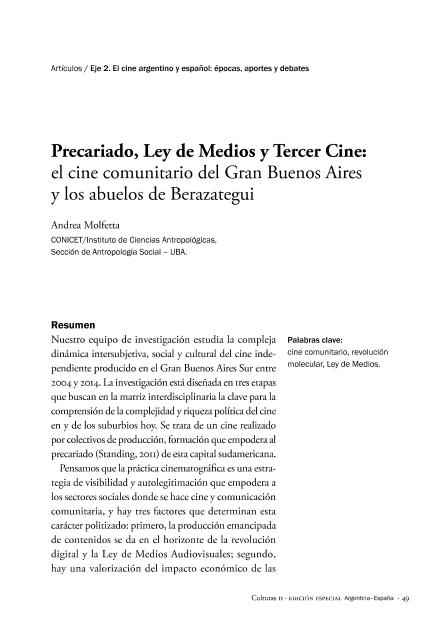Mostrar el registro sencillo del ítem
dc.contributor.author
Molfetta, Andrea Celia

dc.date.available
2019-05-28T19:01:34Z
dc.date.issued
2017-12
dc.identifier.citation
Molfetta, Andrea Celia; Precariado, Ley de Medios y Tercer Cine: el cine comunitario del Gran Buenos Aires y los abuelos de Berazategui; Universidad Nacional del Litoral; Culturas; 11; 12-2017; 49-71
dc.identifier.issn
2362-5538
dc.identifier.uri
http://hdl.handle.net/11336/77342
dc.description.abstract
Nuestro equipo de investigación estudia la compleja dinámica intersubjetiva, social y cultural del cine independiente producido en el Gran Buenos Aires Sur entre 2004 y 2014. La investigación está diseñada en tres etapas que buscan en la matriz interdisciplinaria la clave para la comprensión de la complejidad y riqueza política del cine en y de los suburbios hoy. Se trata de un cine realizado por colectivos de producción, formación que empodera al precariado (Standing, 2011) de esta capital sudamericana. Pensamos que la práctica cinematográfica es una estrategia de visibilidad y autolegitimación que empodera a los sectores sociales donde se hace cine y comunicación comunitaria, y hay tres factores que determinan esta carácter politizado: primero, la producción emancipada de contenidos se da en el horizonte de la revolución digital y la Ley de Medios Audiovisuales; segundo, hay una valorización del impacto económico de las políticas culturales, en términos de transferencia y multiplicación de saberes profesionales y generación de espacios de trabajo en el campo de la comunicación comunitaria. El tercero es que el sentido político de este cine se profundiza cuando observamos que la práctica cinematográfica articula otras prácticas comunitarias vinculadas a la salud, la Economía Social y Solidaria (ESS), el medio ambiente, la educación continua y la participación popular, desenvolviendo una relación de resistencia/colaboración frente al Estado y la industria. Finalmente, podemos afirmar que el sentido político del cine y la comunicación comunitarios está en la generación de una revolución molecular (Guattari, 1978) en las subjetividades que lo producen.
dc.description.abstract
The research project «The cinema that empowers us» studies the complex, intersubjective, social and cultural dynamics of independent cinema of the Southern Greater Buenos Aires (2004–2014), focusing on its political value. Implemented by production collectives, a construction that empowers the precariat (Standing, 2011), this research is designed in three stages that study —in the interdisciplinary matrix— the key to understanding the complexity and the political importance of the cinema of and in the suburbs today. The central hypothesis says that film practice is a strategy of visibility and self–legitimation that empowers the social sectors where film and community communication is practiced. This empowering is implemented in two ways: the emancipated production of contents on the horizon of the digital revolution and the Media Law; and an appreciation of the economic impact of cultural policies, in terms of the multiplication of professional knowledge and the creation of workspaces. The political meaning of this film deepens when we observe that it articulates other community practices related to health, solidarity economy, the environment, continuing education and popular participation. In this sense, it develops a relation of resistance / collaboration with the State and the industry.
dc.format
application/pdf
dc.language.iso
spa
dc.publisher
Universidad Nacional del Litoral
dc.rights
info:eu-repo/semantics/openAccess
dc.rights.uri
https://creativecommons.org/licenses/by-nc-sa/2.5/ar/
dc.subject
Cine Comunitario
dc.subject
Revolucion Molecular
dc.subject
Tercer Cine
dc.subject
Precariado
dc.subject.classification
Otras Artes

dc.subject.classification
Arte

dc.subject.classification
HUMANIDADES

dc.title
Precariado, Ley de Medios y Tercer Cine: el cine comunitario del Gran Buenos Aires y los abuelos de Berazategui
dc.title
Precariat, the Media Law and the Third Cinema: community cinema of the Greater Buenos Aires and the Elderly of Berazategui
dc.type
info:eu-repo/semantics/article
dc.type
info:ar-repo/semantics/artículo
dc.type
info:eu-repo/semantics/publishedVersion
dc.date.updated
2019-05-23T14:01:26Z
dc.journal.number
11
dc.journal.pagination
49-71
dc.journal.pais
Argentina

dc.journal.ciudad
Santa Fé
dc.description.fil
Fil: Molfetta, Andrea Celia. Consejo Nacional de Investigaciones Científicas y Técnicas. Universidad de Buenos Aires; Argentina. Instituto de Ciencias Antropológicas; Argentina
dc.journal.title
Culturas
dc.relation.alternativeid
info:eu-repo/semantics/altIdentifier/doi/https://doi.org/10.14409/culturas.v0i11.6999
dc.relation.alternativeid
info:eu-repo/semantics/altIdentifier/url/https://bibliotecavirtual.unl.edu.ar/publicaciones/index.php/Culturas/article/view/6999
Archivos asociados
